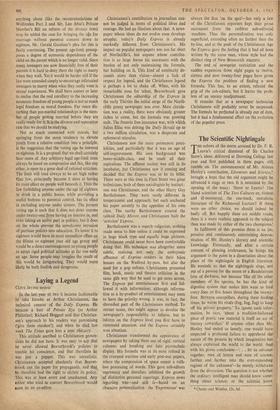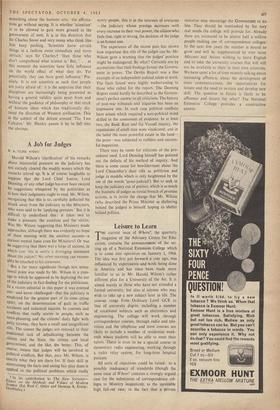The Scientific Nightingale
In fulfilment of this promise there is an im-; pressive and continuously entertaining demon- stration of Mr. Huxley's literary and scientific knowledge. Eventually, and after a certain amount of pleasing irrelevance, he brings his argument to the point in a dissertation about the place of the nightingale in English literature, He reminds us that the nightingale sings, not out of a passion for the moon or a Baudelaircan love of darkness, but because 'like all the other members of his species, he has the kind of digestive system that makes him want to feed every four or live hours throughout the twenty- four. Between caterpillars, during these feeding times, he warns his rivals (Jug, Jug, Jug) to keep off his private property.' To ignore such infor- mation, he says, 'about a tradition-hallowed piece of poetic raw material is itself an act of literary cowardice.' If anyone other than Mr. Huxley had ended so lamely, one would have suspected a profound failure to apprehend the nature of the process by which imagination has always explained the world to the world. And with his pious conclusion—'. . . let us advance together, men of letters and men of science, further and further into the ever-expanding regions of the unknown'—he merely withdraws from the discussion. The question is not whether the ordinary intelligent man should know some- thing about science; or the scientist know
*Chatto and Windus, 12s. 6d.
something about the humane arts: the affirma- tives go without saying. It is whether 'scientism' is to be allowed to gain more ground in the government of men. It is in this direction that Sir Charles Snow and very many who think like him keep pushing. 'Scientists know certain things in a fashion more immediate and more certain,' says Sir Charles,t Than those who don't comprehend what science is.' But, . . at this moment the scientists have little influence on the world effect of what they do. Yet Potentially, they can have gredt influence.' Pre- cisely. It is not scientists as such that people are justly afraid of: it is the suspicion that their disciplines are increasingly being presented as having a general validity quite apart from and Without the guidance of philosophy or that stock of humane ideas which has traditionally dic- tated the direction of Western civilisation. This IS the subject of the debate around 'The Two Cultures.' Mr. Huxley passes it by to fall into the obvious.











































 Previous page
Previous page